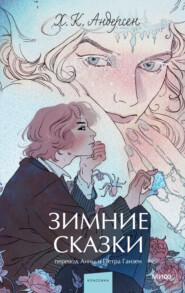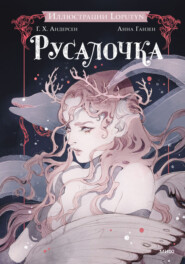По всем вопросам обращайтесь на: info@litportal.ru
(©) 2003-2024.
✖
Fairy Tales of Hans Christian Andersen
Настройки чтения
Размер шрифта
Высота строк
Поля
"There rolls another avalanche," said those in the valley.
X. THE GODMOTHER
At Montreux, one of the towns which encircle the northeast part of the lake of Geneva, lived Babette's godmother, the noble English lady, with her daughters and a young relative. They had only lately arrived, yet the miller had paid them a visit, and informed them of Babette's engagement to Rudy. The whole story of their meeting at Interlachen, and his brave adventure with the eaglet, were related to them, and they were all very much interested, and as pleased about Rudy and Babette as the miller himself. The three were invited to come to Montreux; it was but right for Babette to become acquainted with her godmother, who wished to see her very much. A steam-boat started from the town of Villeneuve, at one end of the lake of Geneva, and arrived at Bernex, a little town beyond Montreux, in about half an hour. And in this boat, the miller, with his daughter and Rudy, set out to visit her godmother. They passed the coast which has been so celebrated in song. Here, under the walnut-trees, by the deep blue lake, sat Byron, and wrote his melodious verses about the prisoner confined in the gloomy castle of Chillon. Here, where Clarens, with its weeping-willows, is reflected in the clear water, wandered Rousseau, dreaming of Heloise. The river Rhone glides gently by beneath the lofty snow-capped hills of Savoy, and not far from its mouth lies a little island in the lake, so small that, seen from the shore, it looks like a ship. The surface of the island is rocky; and about a hundred years ago, a lady caused the ground to be covered with earth, in which three acacia-trees were planted, and the whole enclosed with stone walls. The acacia-trees now overshadow every part of the island. Babette was enchanted with the spot; it seemed to her the most beautiful object in the whole voyage, and she thought how much she should like to land there. But the steam-ship passed it by, and did not stop till it reached Bernex. The little party walked slowly from this place to Montreux, passing the sun-lit walls with which the vineyards of the little mountain town of Montreux are surrounded, and peasants' houses, overshadowed by fig-trees, with gardens in which grow the laurel and the cypress.
Halfway up the hill stood the boarding-house in which Babette's godmother resided. She was received most cordially; her godmother was a very friendly woman, with a round, smiling countenance. When a child, her head must have resembled one of Raphael's cherubs; it was still an angelic face, with its white locks of silvery hair. The daughters were tall, elegant, slender maidens.
The young cousin, whom they had brought with them, was dressed in white from head to foot; he had golden hair and golden whiskers, large enough to be divided amongst three gentlemen; and he began immediately to pay the greatest attention to Babette.
Richly bound books, note-paper, and drawings, lay on the large table. The balcony window stood open, and from it could be seen the beautiful wide extended lake, the water so clear and still, that the mountains of Savoy, with their villages, woods, and snow-crowned peaks, were clearly reflected in it.
Rudy, who was usually so lively and brave, did not in the least feel himself at home; he acted as if he were walking on peas, over a slippery floor. How long and wearisome the time appeared; it was like being in a treadmill. And then they went out for a walk, which was very slow and tedious. Two steps forward and one backwards had Rudy to take to keep pace with the others. They walked down to Chillon, and went over the old castle on the rocky island. They saw the implements of torture, the deadly dungeons, the rusty fetters in the rocky walls, the stone benches for those condemned to death, the trap-doors through which the unhappy creatures were hurled upon iron spikes, and impaled alive. They called looking at all these a pleasure. It certainly was the right place to visit. Byron's poetry had made it celebrated in the world. Rudy could only feel that it was a place of execution. He leaned against the stone framework of the window, and gazed down into the deep, blue water, and over to the little island with the three acacias, and wished himself there, away and free from the whole chattering party. But Babette was most unusually lively and good-tempered.
"I have been so amused," she said.
The cousin had found her quite perfect.
"He is a perfect fop," said Rudy; and this was the first time Rudy had said anything that did not please Babette.
The Englishman had made her a present of a little book, in remembrance of their visit to Chillon. It was Byron's poem, "The Prisoner of Chillon," translated into French, so that Babette could read it.
"The book may be very good," said Rudy; "but that finely combed fellow who gave it to you is not worth much."
"He looks something like a flour-sack without any flour," said the miller, laughing at his own wit. Rudy laughed, too, for so had he appeared to him.
XI. THE COUSIN
When Rudy went a few days after to pay a visit to the mill, he found the young Englishman there. Babette was just thinking of preparing some trout to set before him. She understood well how to garnish the dish with parsley, and make it look quite tempting. Rudy thought all this quite unnecessary. What did the Englishman want there? What was he about? Why should he be entertained, and waited upon by Babette? Rudy was jealous, and that made Babette happy. It amused her to discover all the feelings of his heart; the strong points and weak ones. Love was to her as yet only a pastime, and she played with Rudy's whole heart. At the same time it must be acknowledged that her fortune, her whole life, her inmost thoughts, her best and most noble feelings in this world were all for him. Still the more gloomy he looked, the more her eyes laughed. She could almost have kissed the fair Englishman, with the golden whiskers, if by so doing she could have put Rudy in a rage, and made him run out of the house. That would have proved how much he loved her. All this was not right in Babette, but she was only nineteen years of age, and she did not reflect on what she did, neither did she think that her conduct would appear to the young Englishman as light, and not even becoming the modest and much-loved daughter of the miller.
The mill at Bex stood in the highway, which passed under the snow-clad mountains, and not far from a rapid mountain-stream, whose waters seemed to have been lashed into a foam like soap-suds. This stream, however, did not pass near enough to the mill, and therefore the mill-wheel was turned by a smaller stream which tumbled down the rocks on the opposite side, where it was opposed by a stone mill-dam, and obtained greater strength and speed, till it fell into a large basin, and from thence through a channel to the mill-wheel. This channel sometimes overflowed, and made the path so slippery that any one passing that way might easily fall in, and be carried towards the mill wheel with frightful rapidity. Such a catastrophe nearly happened to the young Englishman. He had dressed himself in white clothes, like a miller's man, and was climbing the path to the miller's house, but he had never been taught to climb, and therefore slipped, and nearly went in head-foremost. He managed, however, to scramble out with wet sleeves and bespattered trousers. Still, wet and splashed with mud, he contrived to reach Babette's window, to which he had been guided by the light that shone from it. Here he climbed the old linden-tree that stood near it, and began to imitate the voice of an owl, the only bird he could venture to mimic. Babette heard the noise, and glanced through the thin window curtain; but when she saw the man in white, and guessed who he was, her little heart beat with terror as well as anger. She quickly put out the light, felt if the fastening of the window was secure, and then left him to howl as long as he liked. How dreadful it would be, thought Babette, if Rudy were here in the house. But Rudy was not in the house. No, it was much worse, he was outside, standing just under the linden-tree. He was speaking loud, angry words. He could fight, and there might be murder! Babette opened the window in alarm, and called Rudy's name; she told him to go away, she did not wish him to remain there.
"You do not wish me to stay," cried he; "then this is an appointment you expected – this good friend whom you prefer to me. Shame on you, Babette!"
"You are detestable!" exclaimed Babette, bursting into tears. "Go away. I hate you."
"I have not deserved this," said Rudy, as he turned away, his cheeks burning, and his heart like fire.
Babette threw herself on the bed, and wept bitterly. "So much as I loved thee, Rudy, and yet thou canst think ill of me."
Thus her anger broke forth; it relieved her, however: otherwise she would have been more deeply grieved; but now she could sleep soundly, as youth only can sleep.
XII. EVIL POWERS
Rudy left Bex, and took his way home along the mountain path. The air was fresh, but cold; for here amidst the deep snow, the Ice Maiden reigned. He was so high up that the large trees beneath him, with their thick foliage, appeared like garden plants, and the pines and bushes even less. The Alpine roses grew near the snow, which lay in detached stripes, and looked like linen laid out to bleach. A blue gentian grew in his path, and he crushed it with the butt end of his gun. A little higher up, he espied two chamois. Rudy's eyes glistened, and his thoughts flew at once in a different direction; but he was not near enough to take a sure aim. He ascended still higher, to a spot where a few rough blades of grass grew between the blocks of stone and the chamois passed quietly on over the snow-fields. Rudy walked hurriedly, while the clouds of mist gathered round him. Suddenly he found himself on the brink of a precipitous rock. The rain was falling in torrents. He felt a burning thirst, his head was hot, and his limbs trembled with cold. He seized his hunting-flask, but it was empty; he had not thought of filling it before ascending the mountain. He had never been ill in his life, nor ever experienced such sensations as those he now felt. He was so tired that he could scarcely resist lying down at his full length to sleep, although the ground was flooded with the rain. Yet when he tried to rouse himself a little, every object around him danced and trembled before his eyes.
Suddenly he observed in the doorway of a hut newly built under the rock, a young maiden. He did not remember having seen this hut before, yet there it stood; and he thought, at first, that the young maiden was Annette, the schoolmaster's daughter, whom he had once kissed in the dance. The maiden was not Annette; yet it seemed as if he had seen her somewhere before, perhaps near Grindelwald, on the evening of his return home from Interlachen, after the shooting-match.
"How did you come here?" he asked.
"I am at home," she replied; "I am watching my flocks."
"Your flocks!" he exclaimed; "where do they find pasture? There is nothing here but snow and rocks."
"Much you know of what grows here," she replied, laughing. "Not far beneath us there is beautiful pasture-land. My goats go there. I tend them carefully; I never miss one. What is once mine remains mine."
"You are bold," said Rudy.
"And so are you," she answered.
"Have you any milk in the house?" he asked; "if so, give me some to drink; my thirst is intolerable."
"I have something better than milk," she replied, "which I will give you. Some travellers who were here yesterday with their guide left behind them a half a flask of wine, such as you have never tasted. They will not come back to fetch it, I know, and I shall not drink it; so you shall have it."
Then the maiden went to fetch the wine, poured some into a wooden cup, and offered it to Rudy.
"How good it is!" said he; "I have never before tasted such warm, invigorating wine." And his eyes sparkled with new life; a glow diffused itself over his frame; it seemed as if every sorrow, every oppression were banished from his mind, and a fresh, free nature were stirring within him. "You are surely Annette, the schoolmaster's daughter," cried he; "will you give me a kiss?"
"Yes, if you will give me that beautiful ring which you wear on your finger."
"My betrothal ring?" he replied.
"Yes, just so," said the maiden, as she poured out some more wine, and held it to his lips. Again he drank, and a living joy streamed through every vein.
"The whole world is mine, why therefore should I grieve?" thought he. "Everything is created for our enjoyment and happiness. The stream of life is a stream of happiness; let us flow on with it to joy and felicity."
Rudy gazed on the young maiden; it was Annette, and yet it was not Annette; still less did he suppose it was the spectral phantom, whom he had met near Grindelwald. The maiden up here on the mountain was fresh as the new fallen snow, blooming as an Alpine rose, and as nimble-footed as a young kid. Still, she was one of Adam's race, like Rudy. He flung his arms round the beautiful being, and gazed into her wonderfully clear eyes, – only for a moment; but in that moment words cannot express the effect of his gaze. Was it the spirit of life or of death that overpowered him? Was he rising higher, or sinking lower and lower into the deep, deadly abyss? He knew not; but the walls of ice shone like blue-green glass; innumerable clefts yawned around him, and the water-drops tinkled like the chiming of church bells, and shone clearly as pearls in the light of a pale-blue flame. The Ice Maiden, for she it was, kissed him, and her kiss sent a chill as of ice through his whole frame. A cry of agony escaped from him; he struggled to get free, and tottered from her. For a moment all was dark before his eyes, but when he opened them again it was light, and the Alpine maiden had vanished. The powers of evil had played their game; the sheltering hut was no more to be seen. The water trickled down the naked sides of the rocks, and snow lay thickly all around. Rudy shivered with cold; he was wet through to the skin; and his ring was gone, – the betrothal ring that Babette had given him. His gun lay near him in the snow; he took it up and tried to discharge it, but it missed fire. Heavy clouds lay on the mountain clefts, like firm masses of snow. Upon one of these Vertigo sat, lurking after his powerless prey, and from beneath came a sound as if a piece of rock had fallen from the cleft, and was crushing everything that stood in its way or opposed its course.
But, at the miller's, Babette sat alone and wept. Rudy had not been to see her for six days. He who was in the wrong, and who ought to ask her forgiveness; for did she not love him with her whole heart?
XIII. AT THE MILL
"What strange creatures human beings are," said the parlor-cat to the kitchen-cat; "Babette and Rudy have fallen out with each other. She sits and cries, and he thinks no more about her."
"That does not please me to hear," said the kitchen-cat.
"Nor me either," replied the parlor-cat; "but I do not take it to heart. Babette may fall in love with the red whiskers, if she likes, but he has not been here since he tried to get on the roof."
The powers of evil carry on their game both around us and within us. Rudy knew this, and thought a great deal about it. What was it that had happened to him on the mountain? Was it really a ghostly apparition, or a fever dream? Rudy knew nothing of fever, or any other ailment. But, while he judged Babette, he began to examine his own conduct. He had allowed wild thoughts to chase each other in his heart, and a fierce tornado to break loose. Could he confess to Babette, indeed, every thought which in the hour of temptation might have led him to wrong doing? He had lost her ring, and that very loss had won him back to her. Could she expect him to confess? He felt as if his heart would break while he thought of it, and while so many memories lingered on his mind. He saw her again, as she once stood before him, a laughing, spirited child; many loving words, which she had spoken to him out of the fulness of her love, came like a ray of sunshine into his heart, and soon it was all sunshine as he thought of Babette. But she must also confess she was wrong; that she should do.
He went to the mill – he went to confession. It began with a kiss, and ended with Rudy being considered the offender. It was such a great fault to doubt Babette's truth – it was most abominable of him. Such mistrust, such violence, would cause them both great unhappiness. This certainly was very true, she knew that; and therefore Babette preached him a little sermon, with which she was herself much amused, and during the preaching of which she looked quite lovely. She acknowledged, however, that on one point Rudy was right. Her godmother's nephew was a fop: she intended to burn the book which he had given her, so that not the slightest thing should remain to remind her of him.
"Well, that quarrel is all over," said the kitchen-cat. "Rudy is come back, and they are friends again, which they say is the greatest of all pleasures."
"I heard the rats say one night," said the kitchen-cat, "that the greatest pleasure in the world was to eat tallow candles and to feast on rancid bacon. Which are we to believe, the rats or the lovers?"
"Neither of them," said the parlor-cat; "it is always the safest plan to believe nothing you hear."
The greatest happiness was coming for Rudy and Babette. The happy day, as it is called, that is, their wedding-day, was near at hand. They were not to be married at the church at Bex, nor at the miller's house; Babette's godmother wished the nuptials to be solemnized at Montreux, in the pretty little church in that town. The miller was very anxious that this arrangement should be agreed to. He alone knew what the newly-married couple would receive from Babette's godmother, and he knew also that it was a wedding present well worth a concession. The day was fixed, and they were to travel as far as Villeneuve the evening before, to be in time for the steamer which sailed in the morning for Montreux, and the godmother's daughters were to dress and adorn the bride.
X. THE GODMOTHER
At Montreux, one of the towns which encircle the northeast part of the lake of Geneva, lived Babette's godmother, the noble English lady, with her daughters and a young relative. They had only lately arrived, yet the miller had paid them a visit, and informed them of Babette's engagement to Rudy. The whole story of their meeting at Interlachen, and his brave adventure with the eaglet, were related to them, and they were all very much interested, and as pleased about Rudy and Babette as the miller himself. The three were invited to come to Montreux; it was but right for Babette to become acquainted with her godmother, who wished to see her very much. A steam-boat started from the town of Villeneuve, at one end of the lake of Geneva, and arrived at Bernex, a little town beyond Montreux, in about half an hour. And in this boat, the miller, with his daughter and Rudy, set out to visit her godmother. They passed the coast which has been so celebrated in song. Here, under the walnut-trees, by the deep blue lake, sat Byron, and wrote his melodious verses about the prisoner confined in the gloomy castle of Chillon. Here, where Clarens, with its weeping-willows, is reflected in the clear water, wandered Rousseau, dreaming of Heloise. The river Rhone glides gently by beneath the lofty snow-capped hills of Savoy, and not far from its mouth lies a little island in the lake, so small that, seen from the shore, it looks like a ship. The surface of the island is rocky; and about a hundred years ago, a lady caused the ground to be covered with earth, in which three acacia-trees were planted, and the whole enclosed with stone walls. The acacia-trees now overshadow every part of the island. Babette was enchanted with the spot; it seemed to her the most beautiful object in the whole voyage, and she thought how much she should like to land there. But the steam-ship passed it by, and did not stop till it reached Bernex. The little party walked slowly from this place to Montreux, passing the sun-lit walls with which the vineyards of the little mountain town of Montreux are surrounded, and peasants' houses, overshadowed by fig-trees, with gardens in which grow the laurel and the cypress.
Halfway up the hill stood the boarding-house in which Babette's godmother resided. She was received most cordially; her godmother was a very friendly woman, with a round, smiling countenance. When a child, her head must have resembled one of Raphael's cherubs; it was still an angelic face, with its white locks of silvery hair. The daughters were tall, elegant, slender maidens.
The young cousin, whom they had brought with them, was dressed in white from head to foot; he had golden hair and golden whiskers, large enough to be divided amongst three gentlemen; and he began immediately to pay the greatest attention to Babette.
Richly bound books, note-paper, and drawings, lay on the large table. The balcony window stood open, and from it could be seen the beautiful wide extended lake, the water so clear and still, that the mountains of Savoy, with their villages, woods, and snow-crowned peaks, were clearly reflected in it.
Rudy, who was usually so lively and brave, did not in the least feel himself at home; he acted as if he were walking on peas, over a slippery floor. How long and wearisome the time appeared; it was like being in a treadmill. And then they went out for a walk, which was very slow and tedious. Two steps forward and one backwards had Rudy to take to keep pace with the others. They walked down to Chillon, and went over the old castle on the rocky island. They saw the implements of torture, the deadly dungeons, the rusty fetters in the rocky walls, the stone benches for those condemned to death, the trap-doors through which the unhappy creatures were hurled upon iron spikes, and impaled alive. They called looking at all these a pleasure. It certainly was the right place to visit. Byron's poetry had made it celebrated in the world. Rudy could only feel that it was a place of execution. He leaned against the stone framework of the window, and gazed down into the deep, blue water, and over to the little island with the three acacias, and wished himself there, away and free from the whole chattering party. But Babette was most unusually lively and good-tempered.
"I have been so amused," she said.
The cousin had found her quite perfect.
"He is a perfect fop," said Rudy; and this was the first time Rudy had said anything that did not please Babette.
The Englishman had made her a present of a little book, in remembrance of their visit to Chillon. It was Byron's poem, "The Prisoner of Chillon," translated into French, so that Babette could read it.
"The book may be very good," said Rudy; "but that finely combed fellow who gave it to you is not worth much."
"He looks something like a flour-sack without any flour," said the miller, laughing at his own wit. Rudy laughed, too, for so had he appeared to him.
XI. THE COUSIN
When Rudy went a few days after to pay a visit to the mill, he found the young Englishman there. Babette was just thinking of preparing some trout to set before him. She understood well how to garnish the dish with parsley, and make it look quite tempting. Rudy thought all this quite unnecessary. What did the Englishman want there? What was he about? Why should he be entertained, and waited upon by Babette? Rudy was jealous, and that made Babette happy. It amused her to discover all the feelings of his heart; the strong points and weak ones. Love was to her as yet only a pastime, and she played with Rudy's whole heart. At the same time it must be acknowledged that her fortune, her whole life, her inmost thoughts, her best and most noble feelings in this world were all for him. Still the more gloomy he looked, the more her eyes laughed. She could almost have kissed the fair Englishman, with the golden whiskers, if by so doing she could have put Rudy in a rage, and made him run out of the house. That would have proved how much he loved her. All this was not right in Babette, but she was only nineteen years of age, and she did not reflect on what she did, neither did she think that her conduct would appear to the young Englishman as light, and not even becoming the modest and much-loved daughter of the miller.
The mill at Bex stood in the highway, which passed under the snow-clad mountains, and not far from a rapid mountain-stream, whose waters seemed to have been lashed into a foam like soap-suds. This stream, however, did not pass near enough to the mill, and therefore the mill-wheel was turned by a smaller stream which tumbled down the rocks on the opposite side, where it was opposed by a stone mill-dam, and obtained greater strength and speed, till it fell into a large basin, and from thence through a channel to the mill-wheel. This channel sometimes overflowed, and made the path so slippery that any one passing that way might easily fall in, and be carried towards the mill wheel with frightful rapidity. Such a catastrophe nearly happened to the young Englishman. He had dressed himself in white clothes, like a miller's man, and was climbing the path to the miller's house, but he had never been taught to climb, and therefore slipped, and nearly went in head-foremost. He managed, however, to scramble out with wet sleeves and bespattered trousers. Still, wet and splashed with mud, he contrived to reach Babette's window, to which he had been guided by the light that shone from it. Here he climbed the old linden-tree that stood near it, and began to imitate the voice of an owl, the only bird he could venture to mimic. Babette heard the noise, and glanced through the thin window curtain; but when she saw the man in white, and guessed who he was, her little heart beat with terror as well as anger. She quickly put out the light, felt if the fastening of the window was secure, and then left him to howl as long as he liked. How dreadful it would be, thought Babette, if Rudy were here in the house. But Rudy was not in the house. No, it was much worse, he was outside, standing just under the linden-tree. He was speaking loud, angry words. He could fight, and there might be murder! Babette opened the window in alarm, and called Rudy's name; she told him to go away, she did not wish him to remain there.
"You do not wish me to stay," cried he; "then this is an appointment you expected – this good friend whom you prefer to me. Shame on you, Babette!"
"You are detestable!" exclaimed Babette, bursting into tears. "Go away. I hate you."
"I have not deserved this," said Rudy, as he turned away, his cheeks burning, and his heart like fire.
Babette threw herself on the bed, and wept bitterly. "So much as I loved thee, Rudy, and yet thou canst think ill of me."
Thus her anger broke forth; it relieved her, however: otherwise she would have been more deeply grieved; but now she could sleep soundly, as youth only can sleep.
XII. EVIL POWERS
Rudy left Bex, and took his way home along the mountain path. The air was fresh, but cold; for here amidst the deep snow, the Ice Maiden reigned. He was so high up that the large trees beneath him, with their thick foliage, appeared like garden plants, and the pines and bushes even less. The Alpine roses grew near the snow, which lay in detached stripes, and looked like linen laid out to bleach. A blue gentian grew in his path, and he crushed it with the butt end of his gun. A little higher up, he espied two chamois. Rudy's eyes glistened, and his thoughts flew at once in a different direction; but he was not near enough to take a sure aim. He ascended still higher, to a spot where a few rough blades of grass grew between the blocks of stone and the chamois passed quietly on over the snow-fields. Rudy walked hurriedly, while the clouds of mist gathered round him. Suddenly he found himself on the brink of a precipitous rock. The rain was falling in torrents. He felt a burning thirst, his head was hot, and his limbs trembled with cold. He seized his hunting-flask, but it was empty; he had not thought of filling it before ascending the mountain. He had never been ill in his life, nor ever experienced such sensations as those he now felt. He was so tired that he could scarcely resist lying down at his full length to sleep, although the ground was flooded with the rain. Yet when he tried to rouse himself a little, every object around him danced and trembled before his eyes.
Suddenly he observed in the doorway of a hut newly built under the rock, a young maiden. He did not remember having seen this hut before, yet there it stood; and he thought, at first, that the young maiden was Annette, the schoolmaster's daughter, whom he had once kissed in the dance. The maiden was not Annette; yet it seemed as if he had seen her somewhere before, perhaps near Grindelwald, on the evening of his return home from Interlachen, after the shooting-match.
"How did you come here?" he asked.
"I am at home," she replied; "I am watching my flocks."
"Your flocks!" he exclaimed; "where do they find pasture? There is nothing here but snow and rocks."
"Much you know of what grows here," she replied, laughing. "Not far beneath us there is beautiful pasture-land. My goats go there. I tend them carefully; I never miss one. What is once mine remains mine."
"You are bold," said Rudy.
"And so are you," she answered.
"Have you any milk in the house?" he asked; "if so, give me some to drink; my thirst is intolerable."
"I have something better than milk," she replied, "which I will give you. Some travellers who were here yesterday with their guide left behind them a half a flask of wine, such as you have never tasted. They will not come back to fetch it, I know, and I shall not drink it; so you shall have it."
Then the maiden went to fetch the wine, poured some into a wooden cup, and offered it to Rudy.
"How good it is!" said he; "I have never before tasted such warm, invigorating wine." And his eyes sparkled with new life; a glow diffused itself over his frame; it seemed as if every sorrow, every oppression were banished from his mind, and a fresh, free nature were stirring within him. "You are surely Annette, the schoolmaster's daughter," cried he; "will you give me a kiss?"
"Yes, if you will give me that beautiful ring which you wear on your finger."
"My betrothal ring?" he replied.
"Yes, just so," said the maiden, as she poured out some more wine, and held it to his lips. Again he drank, and a living joy streamed through every vein.
"The whole world is mine, why therefore should I grieve?" thought he. "Everything is created for our enjoyment and happiness. The stream of life is a stream of happiness; let us flow on with it to joy and felicity."
Rudy gazed on the young maiden; it was Annette, and yet it was not Annette; still less did he suppose it was the spectral phantom, whom he had met near Grindelwald. The maiden up here on the mountain was fresh as the new fallen snow, blooming as an Alpine rose, and as nimble-footed as a young kid. Still, she was one of Adam's race, like Rudy. He flung his arms round the beautiful being, and gazed into her wonderfully clear eyes, – only for a moment; but in that moment words cannot express the effect of his gaze. Was it the spirit of life or of death that overpowered him? Was he rising higher, or sinking lower and lower into the deep, deadly abyss? He knew not; but the walls of ice shone like blue-green glass; innumerable clefts yawned around him, and the water-drops tinkled like the chiming of church bells, and shone clearly as pearls in the light of a pale-blue flame. The Ice Maiden, for she it was, kissed him, and her kiss sent a chill as of ice through his whole frame. A cry of agony escaped from him; he struggled to get free, and tottered from her. For a moment all was dark before his eyes, but when he opened them again it was light, and the Alpine maiden had vanished. The powers of evil had played their game; the sheltering hut was no more to be seen. The water trickled down the naked sides of the rocks, and snow lay thickly all around. Rudy shivered with cold; he was wet through to the skin; and his ring was gone, – the betrothal ring that Babette had given him. His gun lay near him in the snow; he took it up and tried to discharge it, but it missed fire. Heavy clouds lay on the mountain clefts, like firm masses of snow. Upon one of these Vertigo sat, lurking after his powerless prey, and from beneath came a sound as if a piece of rock had fallen from the cleft, and was crushing everything that stood in its way or opposed its course.
But, at the miller's, Babette sat alone and wept. Rudy had not been to see her for six days. He who was in the wrong, and who ought to ask her forgiveness; for did she not love him with her whole heart?
XIII. AT THE MILL
"What strange creatures human beings are," said the parlor-cat to the kitchen-cat; "Babette and Rudy have fallen out with each other. She sits and cries, and he thinks no more about her."
"That does not please me to hear," said the kitchen-cat.
"Nor me either," replied the parlor-cat; "but I do not take it to heart. Babette may fall in love with the red whiskers, if she likes, but he has not been here since he tried to get on the roof."
The powers of evil carry on their game both around us and within us. Rudy knew this, and thought a great deal about it. What was it that had happened to him on the mountain? Was it really a ghostly apparition, or a fever dream? Rudy knew nothing of fever, or any other ailment. But, while he judged Babette, he began to examine his own conduct. He had allowed wild thoughts to chase each other in his heart, and a fierce tornado to break loose. Could he confess to Babette, indeed, every thought which in the hour of temptation might have led him to wrong doing? He had lost her ring, and that very loss had won him back to her. Could she expect him to confess? He felt as if his heart would break while he thought of it, and while so many memories lingered on his mind. He saw her again, as she once stood before him, a laughing, spirited child; many loving words, which she had spoken to him out of the fulness of her love, came like a ray of sunshine into his heart, and soon it was all sunshine as he thought of Babette. But she must also confess she was wrong; that she should do.
He went to the mill – he went to confession. It began with a kiss, and ended with Rudy being considered the offender. It was such a great fault to doubt Babette's truth – it was most abominable of him. Such mistrust, such violence, would cause them both great unhappiness. This certainly was very true, she knew that; and therefore Babette preached him a little sermon, with which she was herself much amused, and during the preaching of which she looked quite lovely. She acknowledged, however, that on one point Rudy was right. Her godmother's nephew was a fop: she intended to burn the book which he had given her, so that not the slightest thing should remain to remind her of him.
"Well, that quarrel is all over," said the kitchen-cat. "Rudy is come back, and they are friends again, which they say is the greatest of all pleasures."
"I heard the rats say one night," said the kitchen-cat, "that the greatest pleasure in the world was to eat tallow candles and to feast on rancid bacon. Which are we to believe, the rats or the lovers?"
"Neither of them," said the parlor-cat; "it is always the safest plan to believe nothing you hear."
The greatest happiness was coming for Rudy and Babette. The happy day, as it is called, that is, their wedding-day, was near at hand. They were not to be married at the church at Bex, nor at the miller's house; Babette's godmother wished the nuptials to be solemnized at Montreux, in the pretty little church in that town. The miller was very anxious that this arrangement should be agreed to. He alone knew what the newly-married couple would receive from Babette's godmother, and he knew also that it was a wedding present well worth a concession. The day was fixed, and they were to travel as far as Villeneuve the evening before, to be in time for the steamer which sailed in the morning for Montreux, and the godmother's daughters were to dress and adorn the bride.

















